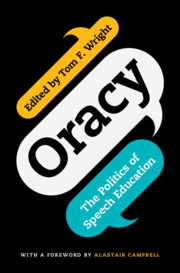Refine search
Actions for selected content:
2 results

Oracy
- The Politics of Speech Education
-
- Published online:
- 23 September 2025
- Print publication:
- 31 July 2025
Introduction
-
-
- Book:
- Oracy
- Published online:
- 23 September 2025
- Print publication:
- 31 July 2025, pp 1-18
-
- Chapter
- Export citation
